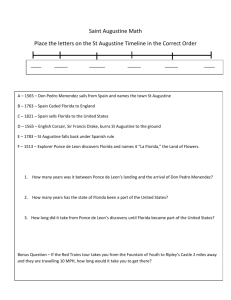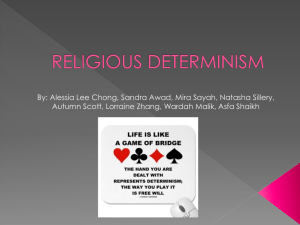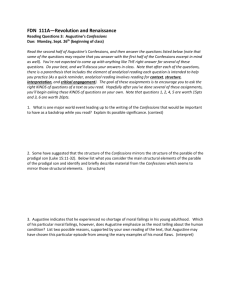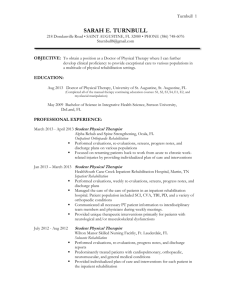The Just-War Principles of Augustine - Sheila T. Harty, Editor, Writer
advertisement
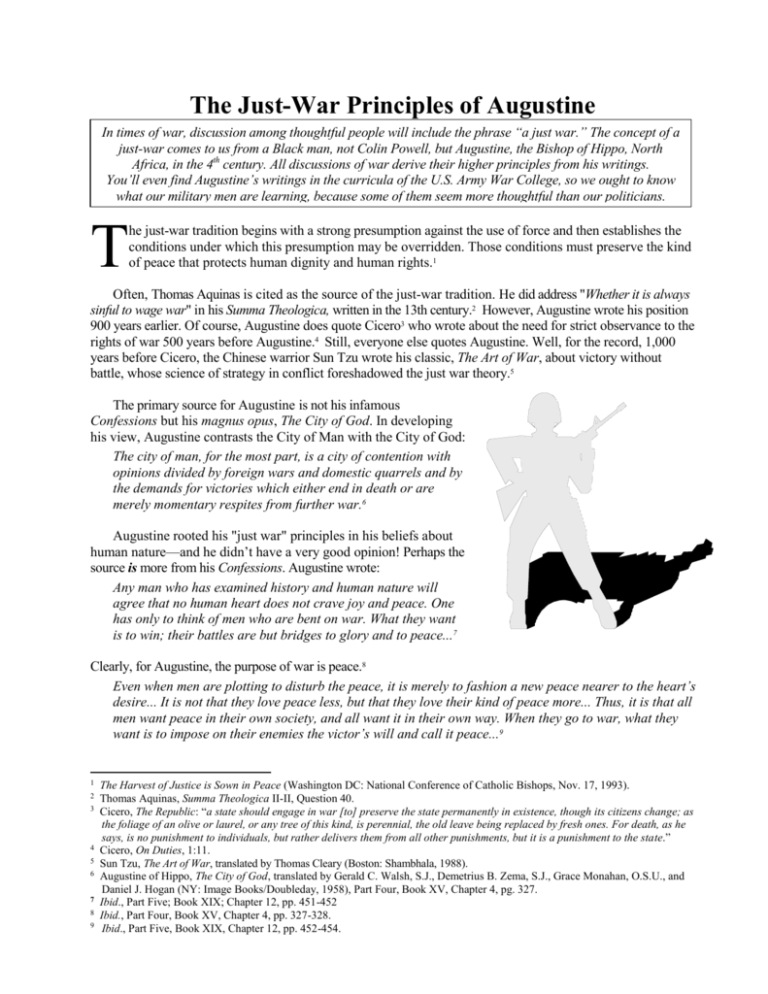
The Just-War Principles of Augustine In times of war, discussion among thoughtful people will include the phrase “a just war.” The concept of a just-war comes to us from a Black man, not Colin Powell, but Augustine, the Bishop of Hippo, North Africa, in the 4th century. All discussions of war derive their higher principles from his writings. You’ll even find Augustine’s writings in the curricula of the U.S. Army War College, so we ought to know what our military men are learning, because some of them seem more thoughtful than our politicians. T he just-war tradition begins with a strong presumption against the use of force and then establishes the conditions under which this presumption may be overridden. Those conditions must preserve the kind of peace that protects human dignity and human rights.1 Often, Thomas Aquinas is cited as the source of the just-war tradition. He did address "Whether it is always sinful to wage war" in his Summa Theologica, written in the 13th century.2 However, Augustine wrote his position 900 years earlier. Of course, Augustine does quote Cicero3 who wrote about the need for strict observance to the rights of war 500 years before Augustine.4 Still, everyone else quotes Augustine. Well, for the record, 1,000 years before Cicero, the Chinese warrior Sun Tzu wrote his classic, The Art of War, about victory without battle, whose science of strategy in conflict foreshadowed the just war theory.5 The primary source for Augustine is not his infamous Confessions but his magnus opus, The City of God. In developing his view, Augustine contrasts the City of Man with the City of God: The city of man, for the most part, is a city of contention with opinions divided by foreign wars and domestic quarrels and by the demands for victories which either end in death or are merely momentary respites from further war.6 Augustine rooted his "just war" principles in his beliefs about human nature—and he didn’t have a very good opinion! Perhaps the source is more from his Confessions. Augustine wrote: Any man who has examined history and human nature will agree that no human heart does not crave joy and peace. One has only to think of men who are bent on war. What they want is to win; their battles are but bridges to glory and to peace...7 Clearly, for Augustine, the purpose of war is peace.8 Even when men are plotting to disturb the peace, it is merely to fashion a new peace nearer to the heart’s desire... It is not that they love peace less, but that they love their kind of peace more... Thus, it is that all men want peace in their own society, and all want it in their own way. When they go to war, what they want is to impose on their enemies the victor’s will and call it peace...9 1 2 3 4 5 6 7 8 9 The Harvest of Justice is Sown in Peace (Washington DC: National Conference of Catholic Bishops, Nov. 17, 1993). Thomas Aquinas, Summa Theologica II-II, Question 40. Cicero, The Republic: “a state should engage in war [to] preserve the state permanently in existence, though its citizens change; as the foliage of an olive or laurel, or any tree of this kind, is perennial, the old leave being replaced by fresh ones. For death, as he says, is no punishment to individuals, but rather delivers them from all other punishments, but it is a punishment to the state.” Cicero, On Duties, 1:11. Sun Tzu, The Art of War, translated by Thomas Cleary (Boston: Shambhala, 1988). Augustine of Hippo, The City of God, translated by Gerald C. Walsh, S.J., Demetrius B. Zema, S.J., Grace Monahan, O.S.U., and Daniel J. Hogan (NY: Image Books/Doubleday, 1958), Part Four, Book XV, Chapter 4, pg. 327. Ibid., Part Five; Book XIX; Chapter 12, pp. 451-452 Ibid., Part Four, Book XV, Chapter 4, pp. 327-328. Ibid., Part Five, Book XIX, Chapter 12, pp. 452-454. S.T. Harty The Just-War Principles of Augustine Page 2 Justice, for Augustine, was the first condition of peace. War is justified only by the injustice of an aggressor; and that injustice ought to be a source of grief to any good man, because it is human injustice.10 But a "just cause" alone does not make a "just war." A just war requires that a full set of principles function together to ensure that other conditions are met.11 THE PRINCIPLES A ugustine originally specified that three principles must be met before resorting to war: “just cause,” “legitimate authority,” “right intention.”12 Over the centuries, moral theologians have added several more principles to Augustine’s three in response to the historical experience of war: • “proportionality” was added to reduce the damage caused by war; • “probability of success” was added to prevent protracted conflict; and • “last resort” was added to urge the exploration of alternatives. These just-war principles have been handily categorized under two circumstances: ad bello and in bello. That is, just criteria “for war” and “in war.” This distinction allowed the addition of “noncombatant immunity” as a 7th principle. Thus, building on Augustine's three criteria, we now have six criteria to determine conditions for engaging a war as "just" and three criteria to determine conditions in waging a war justly. Ethics scholars13 have suggested that modern warfare needs another category—post bello—to cover such responsibilities as land mines, depleted uranium shells, and war crime trials. But here are the principles as they are now, beginning with Augustine’s three: The six criteria for engaging a just war are: Just Cause Legitimate Authority Right Intention Proportionality Probability of Success Last Resort The three criteria in waging a just war are: Proportionality Right Intention Noncombatant Immunity APPLYING THE PRINCIPLES part from the principles themselves, some critics object to accepting any 4th century North African as a source of criteria for or in a 21st century war. Fair enough: 1,700 years is a long time. But has humankind evolved so? Have the baser motives for war changed so—profit motive, greed, ego, territorial imperative, pride, domination, revenge? Perhaps the differences in war today are not the motives but the means. The technological advances of modern warfare have reopened discussion on waging a just war, because the consequences are potentially so catastrophic—for human, animal, vegetable, and mineral. As the National Conference of Catholic Bishops wrote in its 1993 statement on the just-war tradition: A "...the glorification of the technology of destruction in popular culture could inevitably impair our society's ability to apply just-war criteria honestly and effectively in times of crisis."14 10 11 12 13 14 Ibid., Chapter 7, pg. 447. Drew Christiansen, S.J., “Whither the ‘Just War’?” America, March 24, 2003, pg. 8. Ibid. Mark L. Allman, “Postwar Justice,” America, October 17, 2005, pp 9-13. The Harvest of Justice is Sown in Peace. S.T. Harty The Just-War Principles of Augustine Page 3 Yet, these criteria for a just war are still applied in modern times, despite their critics, because these principles have "the force of history and the virtue of clarity."15 Still, a current critic attacks the “strong presumption against war” inherent in these principles, objecting that their application “impedes the restoration of justice.”16 That same critic, a professor of religion at Rutgers, argues that the concept of a just war does not begin with a "presumption against war" but begins instead with a "presumption against injustice focused on the need for responsible use of force in response."17 Well, that's not objecting to the application of ethical criteria before resorting to war; that's just quibbling—in fact, refining—those criteria. Certainly, some contemporary battle strategies raise serious questions when reflected in the light of a strict just-war analysis, for example: Colin Powell's strategy calling for overwhelming force in the first Gulf War raises issues of proportionality. The preeminence of air power in today's military requires ethical restraint on the arrogance of technology, which presumes one can aim a bomb as if a stiletto. Also, destruction of a city’s infrastructure afflicts ordinary noncombatant citizens long after hostilities against the opposing armies have ceased. In applying just-war principles, a great deal depends on the reasons men undertake wars. The ultimate goal of a just war is to re-establish peace. However, that peace must be preferable to what would have prevailed without the war. Perhaps because of Augustine’s poor opinion of humankind, he notes the abuse of disordered thinking when justifying war for peace: Even when wicked men go to war, they want peace for their own society... Of course, the only means such a conqueror knows is to have all men so fear or love him that they will accept the peace which he imposes.... 18 Any application of just-war principles depends on the availability of accurate information in order to make appropriate determinations. Although we live in the Information Age, we know that accurate unbiased information is not easily obtained from officials bent on war. Augustine shows his humor in distinguishing the lack of communication as a causative factor: After the[home and] city comes the world community, the third stage in the hierarchy of human association... And, of course, as with the perils of the ocean, the bigger the community, the fuller it is of misfortunes... The first misfortune is the lack of communication resulting from language difference... That is why a man is more at home with his dog than with a foreigner.19 THE INDIVIDUAL SOLDIER A ugustine’s just-war principles also help us define the proper relationship between the authority of the state and the conscience of the individual. Just-war theory also allows for selective conscientious objection. Some might, as so many of us did, approve fighting in World War II while objecting to Vietnam. Still, some universal moral principles are binding on all persons. For example, it is immoral for a commander to issue, or for a soldier to obey, a command to kill noncombatants intentionally.20 Yet, in moral theology, acts are judged by their motives. Thus, the soldier is innocent, because his position requires obedience as a duty. 15 16 17 18 19 20 Susan Brooks Thistletwaite, President of Chicago Theological Seminary, "Just War and a Post-Modern World," Special Report 98 (Washington DC: United States Institute of Peace, 2002). James Turner Johnson, Morality and Contemporary Warfare (Princeton University, 1999). James Turner Johnson, Can Modern War Be Just? (New Haven CT: Yale University Press, 1984). The City of God, Part Five, Book XIX, Chapter 12, pp. 452-454. Ibid., Chapter 7, pg. 446. The Harvest of Justice is Sown in Peace. S.T. Harty The Just-War Principles of Augustine Page 4 In arguing against an unjust war, Augustine in now way derides the soldier. In fact, he offers the example of the biblical David with his sling shot against Goliath to illustrate a soldier’s honor and duty.21 He also notes the soldier’s bodily strength as a gift of God.22 Augustine addressed the soldier directly: Some then, in praying for you, fight against your invisible enemies; you fight against their visible enemies, the barbarians. Now let me speak briefly on each of the just-war principles: Just Cause – ad bello A just cause is the most important condition for a just war. Consensus is that physical force is wrong and so may justly be resisted. While rights and wrongs exist on both sides of a conflict, the injustice suffered by one party must significantly outweigh that suffered by the other in order to override the presumption against the use of force. Force may be used only to correct a grave, public evil, such as aggressive violation of the basic rights of whole populations. Self-defense against physical aggression, therefore, is the only sufficient just cause.23 The Bush Administration expanded the principle of self-defense to probable acts of aggression. A just war, however, is only always permissible as self-defense against an aggression already committed. Legitimate Authority – ad bello O nly duly constituted public authorities may wage war. Individuals or groups are not sanctioned to use deadly force even for just causes. The notion of proper authority resides in the sovereign power of the state. However, absolute allegiance to the state means that any resistance is wrong, which prompts the question of whether a poorly accountable, inept, or corrupt regime possesses sovereignty and, thus, the right to declare war. Consequently, the notion of legitimate authority requires a contract between a people and its government. A just government is accountable and does not rule arbitrarily, both prerequisites for a head of state to declare war. Right Intention – ad bello T he only permissible intention of a just war is to redress an injustice already suffered. Even then, a war cannot be considered just if national interest is paramount or overwhelms the pretext of fighting. This principle is specifically a restraint on the lust for power. But at what point does self-interest eclipse right intention? If the only way to secure peace is to annex a belligerent neighbor’s territory, that may be sufficient intention and a just cause. Still, issues of practicality as well as consequence may nullify both. For example, a nation may possess a just cause to defend an oppressed group and the right intention to secure their freedom, yet such a war may not be in the state’s self-interest to fight given its accountability to the citizenry for the expenditure of resources. Right Intention – in bello T he aim of political and military leaders must be peace with justice. Acts of vengeance and indiscriminate violence—whether by individuals, military units, or governments—are always forbidden. Probability of Success – ad bello A war is only just if fought with a reasonable chance of success. Deaths and injury incurred in a futile or hopeless cause are not morally justifiable nor are disproportionate measures to achieve success. This principle includes the calculation of costs and benefits, which carry moral and practical weight. The principle of probable success emphasizes that both human life and economic resources should not be 21 22 23 Henry Paolucci, editor, The Political Writings of St. Augustine (South Bend IN: Gateway Editions, 1962), pg. 180. Ibid., pg. 182. That is, a sufficient cause can effect a result all by itself without help from other causes, which may be necessary for that effect but not sufficient to cause it S.T. Harty The Just-War Principles of Augustine Page 5 wasted. For a small nation threatened with invasion by an armed aggressor, forming alliances with other nations to equalize the odds may be a preferable retaliation or defense. Proportionality – ad bello T he overall destruction from the use of force must be outweighed by the good achieved. States are prohibited from using force that is unnecessary to the objective. Thus, some just-war proponents considered a Civil War to end slavery in the South as a violation of just-war principles, because a greater evil (war) could not be used to end a lesser one (slavery). The principle of proportionality ad bello can overlap proportionality in bello, such as for balance-ofpower considerations. For example, if nation A invades land belonging to nation B, then nation B has just cause to take the land back but not to invade nation A or annex any land of nation A in retaliation. In World War II, the principles of proportionality were sacrificed "in pursuit of a faster end to the war."24 Proportionality – in bello P roportionality demands that a battle ends before it becomes a massacre. This principle was behind Colin Powell's call to end military actions on the Highway of Death in the first Gulf War. A state must attain its military objectives by using no more force than is necessary to avoid disproportionate collateral damage to civilian life and property. Proportionality requires tempering the extent and violence of warfare’s destruction. The principle is utilitarian in seeking to minimize overall suffering. Still, attempts to fight a just war by attacking only military targets can still breach morality by employing disproportionate force. Nuclear weapons, of course, are impossible to use proportionately. Thus, a nuclear war is inherently unjust.25 Last Resort – ad bello A just war can only be waged as a last resort. "War should not be resorted to because it is faster than diplomacy or more demonstrative of a nation's resolve or more illustrative of our unique power in the world. War must be necessary."26 The principle of last resort requires that all non-violent options must first be tried and exhausted before the use of force can be justified. Noncombatant Immunity – in bello W ar must discriminate between combatants and noncombatants. As noncombatants, civilians are never permissible targets of war. The state waging a just war must avoid or minimize even indirect harm to civilians. Yet, the practicalities of warfare unavoidably involve noncombatants, such as targeting a military threat in the middle of a city. Still, the justification of collateral damage requires striking a balance between military objectives and civilian casualties. In contrast, the fire bombing of Dresden and the atomic bombing of Hiroshima and Nagasaki were deliberate attempts to put pressure on enemy governments by specifically attacking noncombatants.27 However, the problem may be who is a combatant. Red-uniformed British soldiers marching in formation are a striking contrast to guerrilla forces in camouflage hiding among civilians. Thus, historically bound principles must evolve. Still, the lack of identification does not give a state the right to kill indiscriminately. Yet being a civilian does not mean one is not a legitimate target. Individuals renounce their immunity by any complicity in aiding or abetting war. 24 25 26 27 J. Bryan H25 Thistlethwaite. Thistlethwaite. Ibid. "Justice in War," Just War Doctrines, Catholic Answers, www.catholic.org. S.T. Harty The Just-War Principles of Augustine Page 6 MODERN CRITICS F or critics, these long-standing principles restrict the options open to policymakers and military planners.28 Some critics would prefer to revert to Augustine’s three—just cause, legitimate authority, and right intention. Other critics want to renounce even these three. As to “right intention,” they defer to political leaders, presuming that they know best. As to “legitimate authority,” they presume sovereignty and scorn any deference to the United Nations. Since September 11, they feel complete disregard for any limits of proportionality, including the limiting principle of “last resort.” Such objections only highlight the need for applying the just-war principles, which require the exercise of prudence.. Their purpose is precisely to place obstacles before a government that is strategizing how to repress evil and restore justice. As a result, we are debating the current Administration’s national security strategy, which asserts pre-emption, prevention, and secrecy as the cornerstone of its military policy. Both pre-emptive and preventive war are morally dangerous innovations, and moral accountability requires some transparency. Policymakers and pundits have called the present war in Iraq an "optional" warthat is, a war of choice! And I thought they were pro-life! Although Saddam Hussein's heinous record does provide a basis for a "just cause," this war was not engaged in self defense nor had our government exhausted other options. Furthermore, what's missing from our government's pursuit of war is a "right intention." As a result, a failure to establish the basis of a just war ad bello requires an even stricter observance to just war principles in bello. Just conjure in your mind's eye some of the carnage and crimes already reported in bello, then you clearly understand Augustine's warning that killing is not the only evil of war. He wrote: The real evils in war are love of violence, revengeful cruelty, fierce and implacable enmity, wild resistance, and the lust of power.29 That’s calling it right! "War is always a defeat for humanity."30 © Copyright, Sheila Harty, 2006. Sheila Harty is a published and award-winning writer with a BA and MA in Theology. Her major was in Catholicism, her minor in Islam, and her thesis in scriptural Judaism. Harty employed her theology degrees in the political arena as “applied ethics,” working for 20 years in Washington DC as a public interest policy advocate, including ten years with Ralph Nader. On sabbatical from Nader, she taught “Business Ethics” at University College Cork, Ireland. In DC, she also worked for U.S. Attorney General Ramsey Clark, former U.S. Surgeon General C. Everett Koop, the World Bank, the United Nations University, the Congressional Budget Office, and the American Assn for the Advancement of Science. She was a consultant with the Centre for Applied Studies in International Negotiations in Geneva, the National Adult Education Assn in Dublin, and the International Organization of Consumers Unions in The Hague. Her first book, Hucksters in the Classroom, won the 1980 George Orwell Award for Honesty & Clarity in Public Language. She moved to St. Augustine, Florida, in 1996 to care for her aging parents, where she also works as a freelance writer and editor. She can be reached by phone at 904 / 826-0563 or by e-mail at s t h a r t y @ b e l l s o u t h . n e t . Her website is h t t p : w w w . s h e i l a - t - h a r t y . c o m 28 29 30 America, pg. 8. Paolucci, pg. 164. Address of His Holiness Pope John Paul II to the Diplomatic Corps, January 13, 2003.



